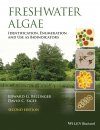Field / Identification Guide Identification Key
By: Edward G Bellinger(Author), David C Sigee(Author)
275 pages, 30 plates with b/w line drawings; colour & b/w photos, colour & b/w illustrations, colour & b/w tables
![Freshwater Algae Freshwater Algae]()
Click to have a closer look
About this book
Contents
Customer reviews
Related titles
About this book
Freshwater Algae provides a comprehensive guide to temperate freshwater algae, with additional information on key species in relation to environmental characteristics and implications for aquatic management. Existing books on freshwater algae fall into two categories: simple identification texts or highly specialised research volumes. There is currently nothing in between that practitioners and students can use on a regular basis. The authors filled this gap with the first edition which provided an accessible, visually appealing volume that is of immediate use to aquatic biologists for algal identification that includes key environmental information on major species.
Freshwater Algae is divided into two parts: part I is a general introduction to algae and techniques for sampling, measuring and observation and then looks at the role of algae as bioindicators and the implications for aquatic management, part II provides the identification of major genera and 250 important species. Freshwater Algae is well illustrated in full colour with numerous original illustrations and photographs. This new revised edition will retain the same clear writing style and accessible format of the first edition with new coverage of species from North America, Asia and Australia in addition to expanded coverage of molecular and computational techniques in algal biology.
Contents
Preface to the First Edition ix
Preface to the Second Edition xi
Acknowledgements xiii
1 Introduction to Freshwater Algae 1
2 Sampling, Biomass Estimation and Counts of Freshwater Algae 43
3 Algae as Bioindicators 101
4 A Key to the More Frequently Occurring Freshwater Algae 141
Glossary 253
References 259
Index 269
Customer Reviews
Field / Identification Guide Identification Key
By: Edward G Bellinger(Author), David C Sigee(Author)
275 pages, 30 plates with b/w line drawings; colour & b/w photos, colour & b/w illustrations, colour & b/w tables
"Nevertheless, I believe the book can be used by many who have an interest in freshwater phycology, including cell biologists, ecologists, evolutionary biologists, environmental conservation specialists, and, last but not least, (advanced) freshwater aquarium enthusiasts who want to learn more about the so-called "good" and "bad" algae in their fish tanks. Bellinger and Sigee prepared a great book, and I highly recommend it to readers."
- J Appl Phycol, 1 March 2013









































